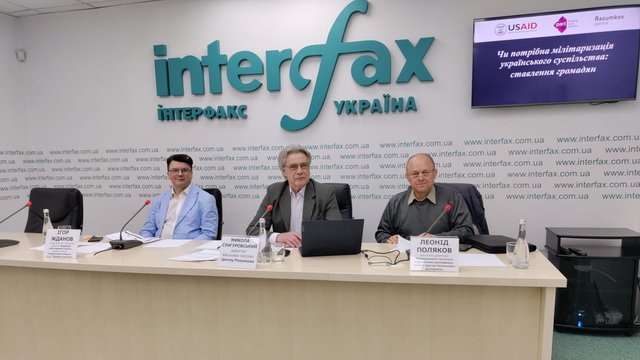Two-thirds of Ukrainians support long-term increases in security, defense funding – opinion poll

The majority of Ukrainians have a positive attitude towards the possibility of changing the state budget priorities for the long term in favor of strengthening the security and defense sector: the Armed Forces, other law enforcement agencies, and the defense industry, according to the results of a national survey conducted on March 21-27 by the Razumkov Center and presented at a press conference at Interfax-Ukraine on Wednesday.
More than 67% of respondents gave a positive answer to the corresponding question, 7% - negative, and 16% - neutral.
At the same time, answering the question "how do you feel about the possibility of changing budget priorities in your community for the long term in favor of increasing security spending," about 64% gave a positive answer, 9% – negative and 17% – neutral.
Answering the question "would you agree to such changes if they affect your personal/family budget," about 50% answered positively, 29% answered negatively, and 22% found it difficult to answer.
"Such answers to the first three questions indicate the following: in society there is an understanding and demand for a policy of strengthening security at the level of state and communities; to ensure support for the implementation of such a policy, a balance must be found between spending on security and ensuring the well-being of citizens," the Razumkov Center notes.
When asked whether they consider it appropriate for communities to spend on the maintenance of voluntary formations (assisting territorial defense, firefighters, emergency rescue teams) in wartime, about 80% of respondents answered positively (only about 10% responded negatively). At the same time, 54% of respondents called the expenses of communities on the maintenance of voluntary formations in peacetime expedient, and 29% inappropriate.
A more positive attitude towards the maintenance of voluntary civil defense units in peacetime: 63% consider such expenses to be appropriate, 22% do not. "This is due to the high demand for the services of rescue services and their contribution in eliminating fires, the consequences of natural disasters, etc.," the press release notes.
The survey was conducted among 2,020 adult respondents from all controlled regions of Ukraine, where there are no hostilities, using a stratified multi-stage sample using random sampling at the first stages of sampling and a quota method for selecting respondents at the final stage. The theoretical sampling error does not exceed 2.3%.






